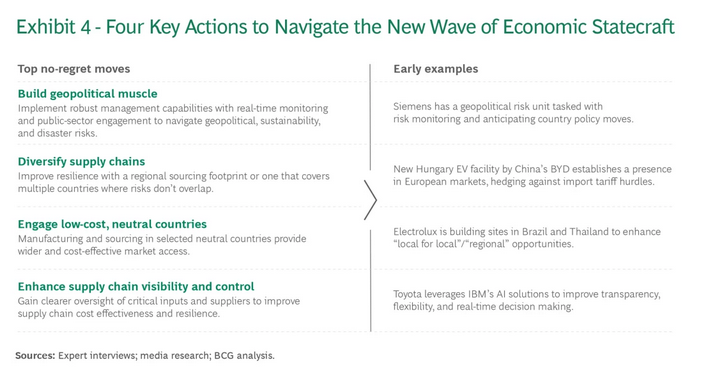December 16, 2024
Industrial strategy or "economic statecraft"
Recent conversations about "industrial strategy" has un-nerved capital. However, it is clear that we are in a place politically where industrial strategies are essential to dealing with American angst.
The world of global trade has changed since the pandemic and would have likely changed in a similar direction even if the pandemic had not happened. Protectionism was necessary as the pendulum bounced off the "maximum free trade" wall. That boundary clearly existed for the USA with the rise of Trump and capital's focus of make everything cheap in China made sure we hit it hard.
The liberal policy folks are couching this all as a shift to "sector and topic-specific plurilateralism".
That is, free trade, but not everywhere. "Friend shoring."

Trump and far-right are less about friend shoring and more about simple protectionism and re-shoring through aggressive exploitation of American imperial tools.
That tool's label is statecraft.
The USA has been long successful in using its currency hegemony, global trade regulations, and supply chain mapping as a tool of its imperialism and economic statecraft. For example, the USA sanctions regime, in many ways, is just an extension to these global regulations.
The problem with the USA so explicitly weaponizing these kinds of international treaties is that it blunts global support for enforcing them.
And, it lumps "good" (at least in intention) international agreements trying to deal with real problems with obvious imperialism through soft power:
- climate change
- right to repair
- circular economy and recycling
- emissions per product
- forced labour in supply chains
- seafood supply chain tracking
- "deforestation" rules
- pesticide and antibiotics in food regulations
The continued failure of these international deals must be seen in the context of the broader collapse of the global liberal economic "order" established under the WTO.
UN COP programs have failed. COP16 Desertification conference ended without any agreement, the third COP meeting this year on specific climate-related treaties to end in complete failure.
Agreements on recycling, global emissions per unit production, and environmental destruction are all wrapped-up in the slow collapsing of these liberal frameworks.
Electronic waste from AI could grow to more than 500,000 tonnes per year by 2030, up from 2,600 tonnes in 2023, according to a December 8 report from Morgan Stanley.
Now, the left has long called out the ineffectiveness of these global agreements. They have quite simply advanced USA economic imperialism. But, that doesn't mean that the stated objective of the deals was wrong because we actually do need to remove slavery from our supply chains, reduce climate and environmentally damaging production, and incorporate regulations to reduce the worst impacts of production.
Socialism is at its core internationalist. That provides a very clear starting point for promoting an alternative to these collapsing frameworks. Maybe even one that does not drag us into a global conflict to defend national capital interests.
But, we must begin articulating it. Local industrial production does not have to be contained in the context of global geopolitics. Sometimes industrial strategies are just about local investment and production of things we need. Sometimes they are supportive of investment where capital refuses to. And many times that investment leads to productive investment and trade in goods the world needs, but cannot produce locally.
Socialists should focus on the gaps in investment to explain what we want from this kind of internationalism and expand it out to describing a vision of the economy we want.
Let's not lose because there was a general failure of imagination and let's not lose because even though we can imagine it no one else could.
Shipping
Along with the increased reliance of geopolitics in trade regulations, industrial strategies are needed to persuade capital to shift investment. If a nation like the USA is going to cut off imports from specific other nations then, for that regulation to be effective, you need to replace that lost supply.
When it comes to China, it is not just the stuff in the ships, it is the ships themselves.
Canada, Finland and the USA signed a deal to produce ice-breakers together. The pact focuses on ice-breakers, but the real goal is to build-up ship building capacity to expand to container and other ships in the future. The USA and Canada has ship building capacity, but it is all focused on war ships.